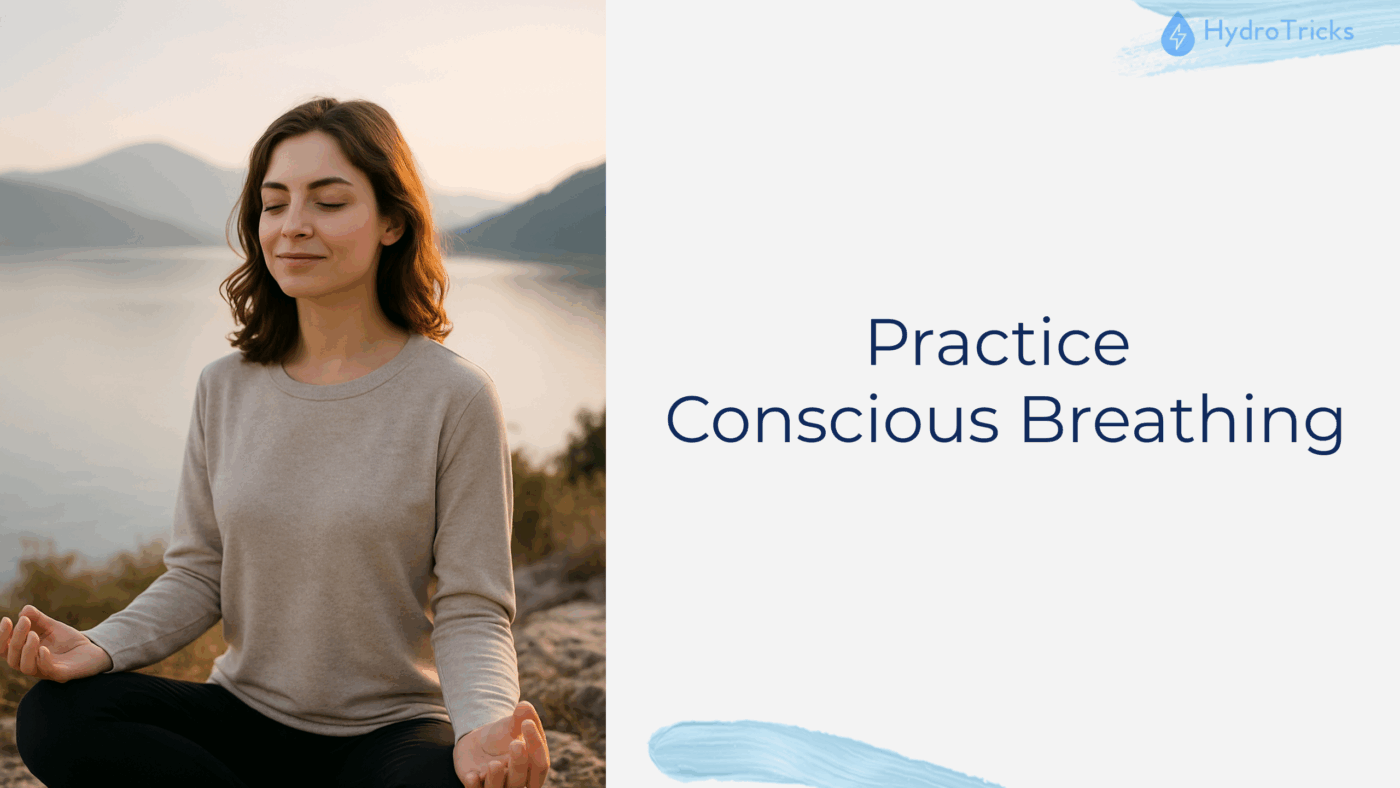In today’s fast-paced, always-connected world, stress has become an unavoidable part of life. However, just because stress is common doesn’t mean it has to control you. By building healthy habits and incorporating the right daily rituals, you can reduce stress, improve your well-being, and build a healthier life with a renewed sense of calm and control.
This guide introduces seven powerful, practical rituals that naturally reduce stress. These aren’t quick fixes, they’re simple habits that, when practiced consistently, can create lasting positive change in your daily life. Whether you’re looking to boost your mood, sleep better, or simply feel more grounded, these rituals are designed to help. Most importantly, they empower you to take control of your stress, and in doing so, you’ll regain control over your life and well-being.
1. Start Your Day with Intention

The way you begin your day sets the tone for everything that follows. A rushed, chaotic morning often leads to a stressful day. Conversely, starting your day with calm and clarity helps you stay centered and reduce stress from the beginning.
Tips for a calming morning ritual:
- Wake up 15–30 minutes earlier than usual.
- Avoid checking your phone first thing.
- Begin with a few minutes of deep breathing or light stretching.
- Set a positive intention like, “Today I choose peace.”
You could also consider writing in a gratitude journal, savoring your first cup of tea or coffee mindfully, or even listening to a short meditation or motivational podcast. These small acts help set a foundation of mental clarity and emotional resilience.
By creating a peaceful morning, you enter the day feeling in control, not overwhelmed—making it easier to reduce stress throughout your day.
Starting your day with intention doesn’t require a huge time commitment. Even five mindful minutes can have a ripple effect on how you handle challenges throughout the day. If mornings are typically hectic for you, consider prepping your clothes or meals the night before to remove friction and support your goal of a stress-free start.
Also, engaging in positive visualization—imagining a successful, calm day ahead—can give you a sense of empowerment and focus. The more consistently you begin with a mindful ritual, the more automatic this peaceful state becomes.
2. Practice Conscious Breathing

Breathing is one of the simplest yet most powerful tools to reduce stress. When you’re anxious or tense, your breathing becomes shallow. By slowing your breath, you signal to your brain that you’re safe, which in turn lowers your stress response.
Try this breathing exercise:
- Inhale deeply through your nose for 4 seconds.
- Hold your breath for 4 seconds.
- Exhale slowly through your mouth for 4 seconds.
- Pause for 4 seconds before repeating.
This method, also called box breathing, is a favorite among mental health professionals and athletes for its ability to quickly reduce stress and promote focus.
You can use breathing techniques anywhere—before a big meeting, during a traffic jam, or when overwhelmed by a crowded inbox. Over time, conscious breathing becomes a built-in pause button for your nervous system.
You may also explore other breathing styles, such as 4-7-8 breathing or alternate nostril breathing, to see which technique resonates most with your body. Breathing can also be combined with visualization—imagine breathing in calm and exhaling tension—to deepen its stress-reducing benefits.
Some individuals integrate breathwork into other practices such as meditation, tai chi, or yoga for added benefits. Breath awareness is a core tool to reduce stress both instantly and over the long term.
3. Move Your Body Every Day

Movement isn’t just good for your physical health—it’s essential for your mental health too. Exercise helps reduce stress by releasing endorphins, improving mood, and clearing mental clutter.
Ways to add movement into your day:
- Take a brisk walk during lunch.
- Try 10 minutes of yoga in the morning or evening.
- Stretch at your desk every hour.
- Dance around your living room!
You don’t need an intense gym session. Any form of movement that gets your blood flowing will help you reduce stress and feel more balanced.
Regular movement also helps you sleep better and improves circulation and digestion, which are often affected by stress. Consider pairing your exercise with time in nature for added calming effects.
Even household chores like vacuuming or gardening can count as movement. The key is to get your body out of a sedentary state. Over time, consistent daily movement helps regulate cortisol, the primary stress hormone, leading to more sustained emotional balance and energy.
Walking with a friend or joining a group fitness class can add social connection—a powerful secondary benefit in stress reduction. Listen to your body and choose movement that feels joyful, not like a chore.
4. Check In With Yourself Midday
Most people go through their days reacting to stress without realizing how much it’s affecting them. A simple midday check-in can break that pattern and help you respond more thoughtfully.
How to check in:
- Pause for one minute.
- Close your eyes, take three deep breaths.
- Ask yourself: “How am I feeling right now? What do I need?”
You may find that you need a break, a glass of water, a snack, or even a few words of encouragement. By regularly checking in, you stay more emotionally regulated and can reduce stress before it accumulates.
Some people like to set a recurring phone reminder or pair this check-in with lunch. It’s a simple practice that creates powerful mindfulness over time.
This ritual is also an excellent time to reassess your to-do list. Are your expectations realistic? Is there anything you can postpone or delegate? Realigning your focus and expectations midday helps avoid burnout and creates space to reduce stress effectively.
You can also use a feelings wheel or journaling prompt to help name your emotions, making it easier to process them. This practice encourages emotional intelligence, a key factor in managing and reducing stress.
5. Create an Evening Wind-Down Routine

A good night’s sleep is one of the most effective ways to reduce stress. But many of us bring stress to bed, making it hard to fall asleep or stay asleep. An evening wind-down ritual signals to your body that it’s time to rest.
Ideas for a relaxing night routine:
- Turn off screens 60 minutes before bed.
- Dim the lights and play soothing music.
- Drink herbal tea like chamomile or lemon balm.
- Do some light stretching or write in a journal.
Reading a physical book, diffusing calming essential oils, or practicing gentle yoga poses like child’s pose or legs-up-the-wall can help your body and mind transition into rest mode. Let this be your sacred time to unplug and reflect.
Make this routine consistent so your body starts to recognize it as a cue to relax and let go of the day’s tension—helping you sleep better and reduce stress overnight.
Many people find that tracking their sleep habits and incorporating calming affirmations—such as “I am safe and at peace”—can significantly improve their ability to fall asleep with a calm mind.
Creating a sleep-friendly environment is essential too. Consider blackout curtains, white noise machines, or aromatherapy to reinforce a sanctuary for restorative rest.
6. Prioritize Quality Sleep

Sleep isn’t a luxury—it’s a biological necessity. Without adequate rest, your brain can’t function properly, and your stress levels rise. Prioritizing sleep is one of the most powerful ways to consistently reduce stress.
Better sleep habits include:
- Keeping a regular sleep schedule—even on weekends.
- Making your bedroom dark, cool, and quiet.
- Avoiding caffeine or heavy meals in the evening.
- Using a weighted blanket or sleep meditation app.
Sleep impacts hormone regulation, emotional resilience, and cognitive performance. When sleep suffers, everything else suffers. Aim for 7–9 hours of high-quality sleep per night.
If you wake up often during the night, track patterns using a sleep diary or consult a healthcare provider. Better sleep leads to better stress management, so treat it as a top priority.
Additionally, removing distractions from your sleep space—like TVs, phones, or excessive noise—can help deepen your sleep cycles. When you sleep well, you start the day already in a better state to handle challenges and reduce stress more naturally.
Short naps (under 30 minutes) can also be beneficial for some people when used strategically, improving alertness and reducing the toll of sleep deprivation.
7. Reframe Stress with Mindful Awareness

Sometimes stress comes from the stories we tell ourselves. By practicing mindfulness, you can shift your perspective and better manage challenges without being overwhelmed.
Mindfulness techniques to reduce stress:
- Meditation for 5–10 minutes each morning.
- Gratitude journaling to refocus your mind.
- Affirmations like: “I can’t control everything, but I can control how I respond.”
- Walking slowly and attentively in nature.
Mindfulness helps you observe your thoughts without judgment and stay present in the moment. Over time, this can drastically reduce your tendency to ruminate or overreact.
You can also try mindful eating, mindful listening, or even mindful cleaning. The point is to anchor yourself in the now. It’s from that grounded place that you can truly reduce stress and find clarity.
Developing a mindfulness habit takes time, but even just one minute of deep awareness a few times a day can lead to lasting changes in how you experience stress. The more present you are, the less likely you are to be controlled by automatic reactions and anxiety.
Try apps like Headspace or Insight Timer for guided meditations, or simply sit in silence and follow your breath. Mindful awareness is a lifelong skill that pays daily dividends when it comes to emotional balance.
Final Thoughts: Reduce Stress, Regain Control
Stress may be unavoidable, but it doesn’t have to run your life. By building these small yet powerful daily rituals, you take back control of your time, your energy, and your emotional state. Choose one habit to begin today and experience how even a single shift can help you reduce stress and feel more grounded.
When you consistently reduce stress through conscious habits, you sleep better, think clearer, and live with more purpose. Remember: Control your stress. Control your life.

